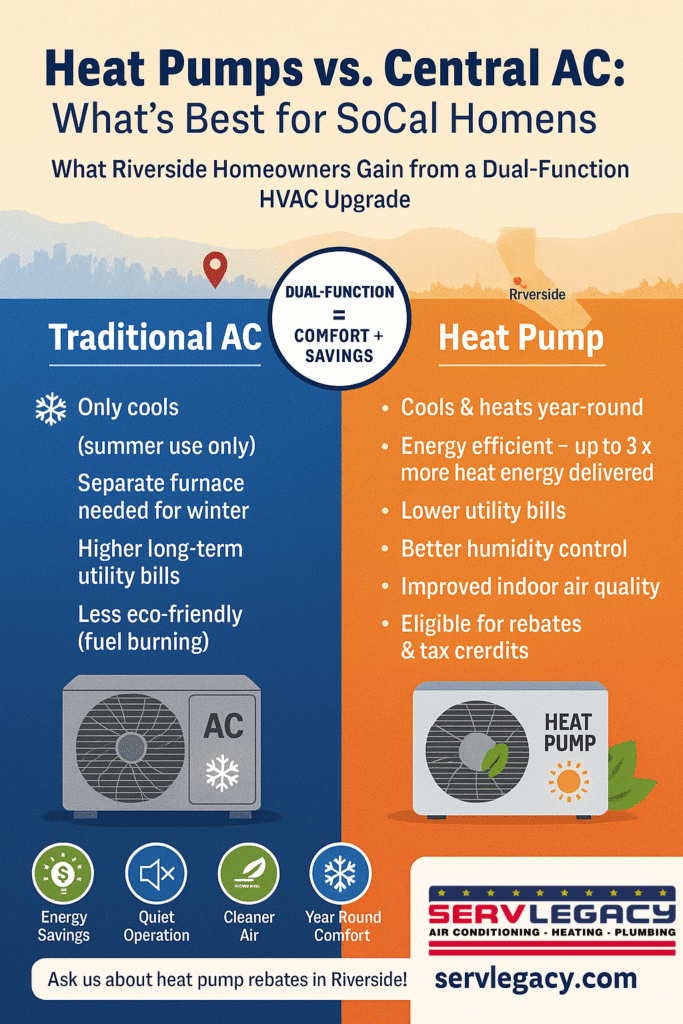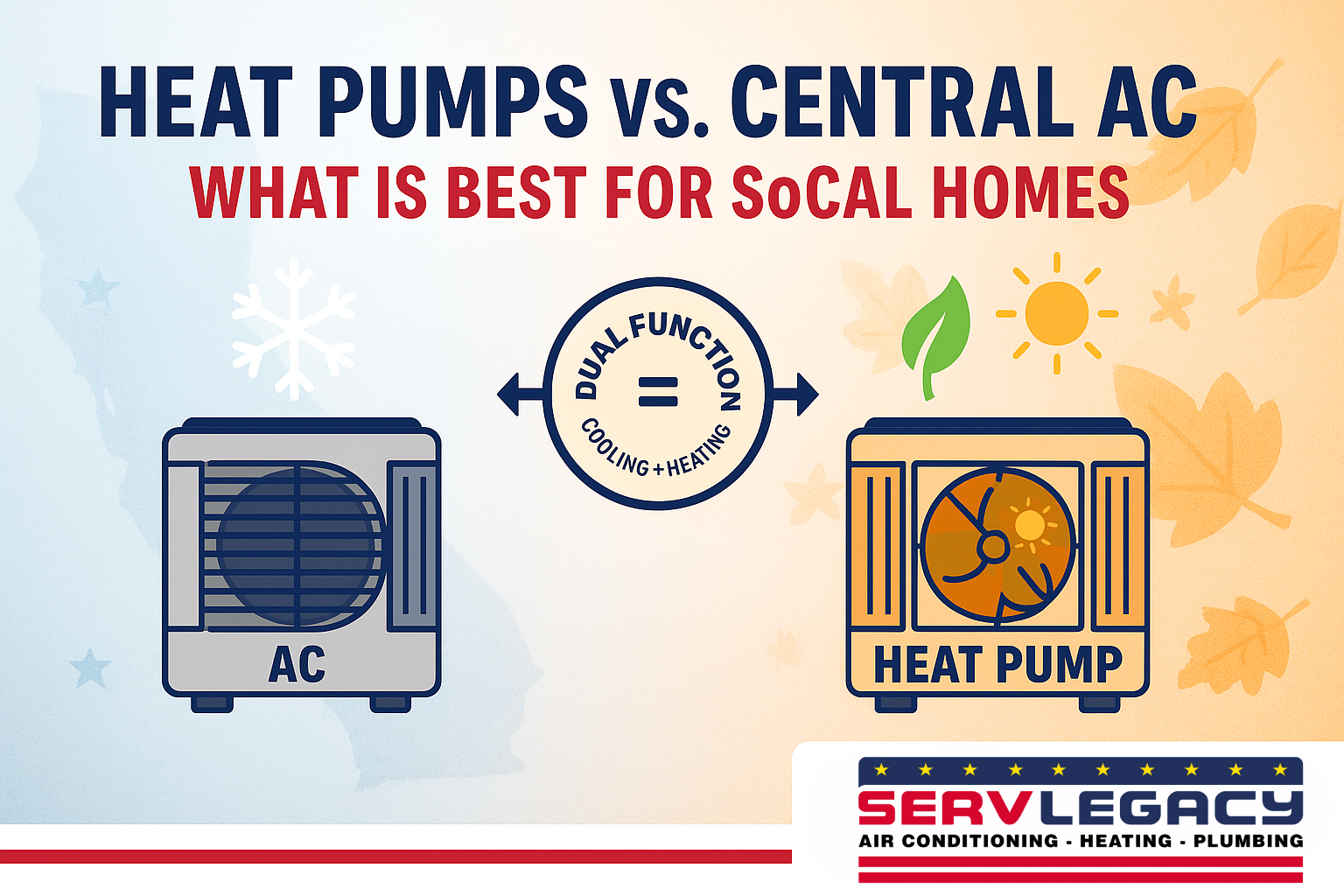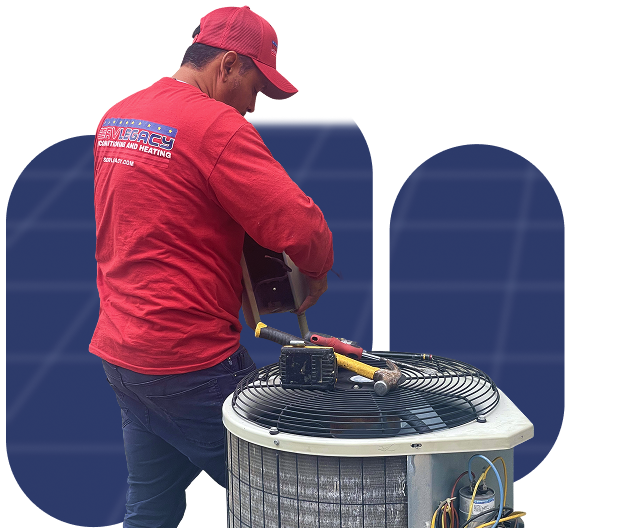Heat Pumps vs. Traditional AC: What Riverside, CA and SoCal Homeowners Gain from a Dual-Function HVAC Upgrade
Heat pumps have become a popular alternative to air conditioners and furnaces. They are extremely effective and efficient, especially in moderate climates like Riverside. Able to transfer heat to cool your home or warm it up, these dual-function systems can be used during every season. We’ll look at the benefits and available options to show what can be gained by upgrading your HVAC system.
Energy Efficiency That Cuts Cooling and Heating Bills
Compared to traditional AC units and furnaces, heat pumps are energy efficient. A single system can deliver up to three times more heating energy than the electricity it uses.
Many traditional heating systems burn fuel to generate heat. Instead, a heat pump moves heat from one location to another. It uses refrigerant to transfer it from relatively cool outside air and deliver warmth. Operating in reverse, it can draw heat away from your home to cool things off. Therefore, you can use the same system whether it’s summer or winter.
When it operates at peak performance, you are likely to see substantially lower utility bills throughout the year.
One System for Year-Round Comfort
A heat pump is a flexible and multifunctional dual-purpose comfort solution. You can replace your AC and heating unit, thereby having less equipment to maintain and repair. This contributes to additional savings over the life of the product. Another heat pump benefit is that you save space with a single system that replaces multiple HVAC units.
Better Dehumidification and Enhanced Comfort in Summer
Humidity control is another advantage. While air conditioners remove humidity via condensation, heat pumps also offer moisture control. To remove moisture, they do so via the following process:
- Warm air is drawn into the system.
- The air cools as it flows over the evaporator coils.
- Moisture in the air forms water droplets.
- Condensed water drains outside.
You can also install a dehumidifier in your HVAC system for optimal moisture control, or a portable one in basements and other high-humidity areas.
Improved Indoor Air Quality with Ductless and Minisplit Options
One major difference between a heat pump vs. a furnace is improvements in air quality. With traditional combustion heaters, dust, soot, and gas leaks can be a concern, especially if equipment malfunctions. Aside from improved efficiency, a dual-function system won’t release carbon monoxide and other dangerous byproducts.
Yet another advantage is improved air filtration. Heat pumps have highly effective air filters that remove a wide range of pollutants to protect internal components and keep them from circulating in your home. You can also install add-on filter components with high Minimum Efficiency Reporting Value (MERV) ratings that achieve even cleaner air.
Better yet, some heat pumps don’t use ductwork, lowering the risk of exposure to allergens and other contaminants. These include the following options:
- Ductless Air-Source Heat Pumps: Suited for homes without air ducts, these are extremely efficient as there are no air or energy losses associated with ductwork. Zoning is possible. Air-to-water heat pumps, which direct hot water through radiators or radiant floor systems, are also ductless.
- Mini-Split Heat Pumps: These ductless HVAC units offer even more effective zoned heating. Mini-splits are more common in colder climates, where fewer homes have ductwork (and often have radiator heating), but are also a viable option in warmer locations.

Quiet, Low-Maintenance Operation That Saves Time and Money
Quiet heat pump operation is a reason more people are turning to this technology. The system runs at a lower decibel level than an air conditioner. This is beneficial if you work from home or engage in other activities that require you to concentrate, or if any members of your household are sensitive to noise.
Fewer components mean that heat pumps have reduced maintenance requirements. We recommend spring and fall checkups, as the system is used all year. But since there are fewer parts to wear out, maintenance tends to be simpler than with traditional HVAC equipment. Regular filter changes, system cleanings, inspections, and tune-ups help optimize performance and maximize efficiency.
Climate-Smart Performance: Efficient Even in Cold Winters
Heat pump technology is most efficient in mild winter climates. Even though the air may feel chilly, there is still heat energy to draw from it. With most systems, you won’t feel the difference. However, standard models may not operate as effectively in sub-freezing temperatures. For chillier regions, cold climate heat pumps (identified by the ENERGY STAR Cold Climate label) can perform well in temperatures as low as 5℉, according to Energy.gov.
Eco-Friendly and Eligible for Rebates or Tax Credits
An eco-friendly heat pump can save you on energy, maintenance, and repair costs. Energy efficiency rebates and tax credits can save you even more. These were introduced with the Inflation Reduction Act, which was signed into law in 2022. Your options include:
- Federal Tax Credits: A tax credit equal to 30% of a heat pump’s installation cost, up to $2,000, is available. You can also save up to $8,000 on an all-electric geothermal heat pump.
- Home Electrification and Appliance Rebates (HEEHRA): Low-to-moderate income California residents can qualify for a HEEHRA rebate, which is acquired through a TECH Clean California contractor.
- Local/Utility Rebates: In Riverside, you can save $750 (per ton) on a 15.2+ SEER electric heat pump air conditioner. Gas and electric utility companies also offer rebates for certain projects, depending on your location.
Choosing the Right Dual-Function System for Your Riverside Home
In our blog, we’ve explored how to find the right air conditioning system and other topics. Having the right dual-purpose system is equally important. Here’s a look at the different types of heat pumps to help you find the right one for your home:
- Air-Source Heat Pumps: Air-source models are the most common, and transfer heat to and from the outside air. These systems are available in ducted and ductless forms (including mini-splits). With advancements in technology, heat pumps have become adaptable to different climates.
- Reverse-Cycle Chillers: These generate hot and cold water to provide temperature control via radiant floor systems throughout your home. They are a type of air-source heat pump.
- Geothermal Heat Pumps: Ground-source systems transfer heat between an area underground and your home. They require vertical or horizontal piping that can be costly to install, but geothermal systems are even more efficient than standard ones.
- Absorption Heat Pumps: These gas-fired systems use heat or thermal energy rather than mechanical energy. They can be powered by natural gas, steam, or solar-heated or geothermal-heated water. Despite being larger, these systems use less electricity.
- Dual-Fuel Heat Pumps: Combine an electric heat pump, which operates at warmer and relatively cool temperatures, and a furnace that switches on when outdoor temperatures drop too low for a heat pump to work efficiently. Hybrid systems are widely available and typically use the same ductwork.
There are also advanced heat pump technologies to consider. If in the market for an upgrade, look for systems with:
- Staged or Multi-Speed Compressors: Adapt heating or cooling capacity based on outdoor temperatures; if inverter-driven, the system can modulate speed or capacity to virtually any percentage of full capacity.
- Variable- or Dual-Speed Motors: Indoor and outdoor fans can have variable-speed controls that keep airflow at a comfortable level. Dual-speed or electrically commutated motors (ECMs) also help optimize performance.
- Desuperheaters: A desuperheater recovers waste heat during cooling mode, allowing the heat pump to heat water, which it does up to three times more efficiently than an electric-resistance water heater.
Upgrade from a Traditional Air Conditioner to a Heat Pump Today
A heat pump operates much more efficiently than traditional air conditioning systems and furnaces. It provides a single heating and cooling solution for year-round comfort. The right model for your home can lower energy bills, enhance comfort, and improve indoor air quality.
Are you looking to upgrade your HVAC system? At ServLegacy, we specialize in the latest solutions. Our certified technicians explain your options and provide honest pricing.
Contact ServLegacy today for help modernizing your home.


